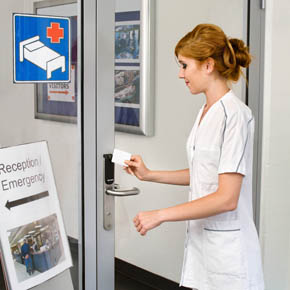
Can the latest access control technologies help keep our hospitals both open and secure?
Thomas Schulz at ASSA ABLOY examines how going wireless can enable hospitals to better protect staff, hospital equipment, patients and their private health data.
 Securing a hospital is a complex, round-the-clock task. Hospitals have to be welcoming public spaces, yet they also house critical assets that must be protected: patients, doctors, nurses and support staff; controlled medicines and confidential patient data; and labs, with their expensive equipment and testing materials. The logistical challenge goes way beyond what the old-fashioned mechanical lock and key was designed to meet.
Securing a hospital is a complex, round-the-clock task. Hospitals have to be welcoming public spaces, yet they also house critical assets that must be protected: patients, doctors, nurses and support staff; controlled medicines and confidential patient data; and labs, with their expensive equipment and testing materials. The logistical challenge goes way beyond what the old-fashioned mechanical lock and key was designed to meet.
Modern locks often need to integrate with existing security systems, fire detection and CCTV. Tailored access permissions make everyone’s work run smoother — so consultants, for example, can open different doors at different times to cleaning staff. Labs have a steady flow of visitors and contractors, and are safer if accessed with time-limited digital “keys” that can be revoked or revalidated when required. In case of a security breach anywhere in the hospital, a thorough investigation is often mandated for regulatory compliance.
Increasingly, this job is far too complex for the humble mechanical lock and key. But what’s the alternative when budgets are tight, especially in the public sector?
A wireless solution for any hospital
An access control system with wired doors and programmable RFID smart cards can solve many of the problems, but conventional wisdom says such a system is expensive and cannot be installed everywhere. The result? It only covers doors with very high security requirements. But the market now offers something better: wireless locks, a much more affordable way to extend access control much deeper into a site, greatly enhancing security for a relatively small outlay.
What’s more, adding wireless locks doesn’t require a hospital to rip up its installed security system and start again. ASSA ABLOY Aperio® locks, for example, simply “plug in” to an existing access system, to bring monitored security to many more openings than would be affordable with wired doors. They interoperate seamlessly with building management systems, linking wirelessly via a communications hub to the existing central system. (An Aperio® installation can incorporate online or offline locks — or a mix of both.) From a compliance perspective, online integration enables audit trails to be generated for any monitored lock, including the battery-powered AperioÆ locks, at any time — making a proper investigation of any breach not just feasible, but fast.
Most importantly, adding wireless access control to more doors allows hospital managers to upgrade security and improve oversight — from monitoring pharmacy entry, to granting cleaners access only to their designated work areas, to revoking the validity of a lost “key card” instantly. And if there’s an electronic access system already in place, site users don’t even need a new smart card. The same RFID key card opens the wireless doors, too.
Wireless access in action
Aperio is already deployed in hospitals all over Europe. As part of a £35 million refurbishment of A&E and other urgent care services, Aintree University Hospital in Liverpool sought an upgrade to its access system. The hospital trust needed flexible access control to streamline day-to-day security operations, extending public access while also maintaining restrictions on sensitive areas.
 They wanted a cost-effective, wire-free system, so installation could be done quickly and without disrupting the day-to-day work of the hospital. ASSA ABLOY partnered with Grantfen and Inner Range to deliver a unified platform, which extended the Integriti access control system with ASSA ABLOY’s Aperio wireless escutcheons.
They wanted a cost-effective, wire-free system, so installation could be done quickly and without disrupting the day-to-day work of the hospital. ASSA ABLOY partnered with Grantfen and Inner Range to deliver a unified platform, which extended the Integriti access control system with ASSA ABLOY’s Aperio wireless escutcheons.
“Aperio escutcheons proved to be the most cost-effective and easy-to-install security solution for the hospital,” explained Sue McIntyre, Grantfen’s General Manager. “Aperio offered a straightforward alternative to a complicated wired solution, without any need to modify the doors. A particularly useful feature for installing the system quickly and efficiently, without disrupting operations within the live building.”
Elsewhere, around 700 doors in Ghent’s new Hospital Maria Middelares have been fitted with Aperio offline locks connected to a Nedap AEOS access control system. Staff now open doors and access secure areas with a single smart card using MIFARE RFID technology. And it took a minimal outlay on Aperio wireless locks to transform security at the Centre Hospitalier Universitaire de Grenoble. Approximately 20 Aperio Online cylinders and escutcheons were installed in hospital buildings. This added Aperio wireless access control drastically reduced theft from the premises.
Cost-efficient components & cost-effective installation
Aperio components can meet all kinds of needs in health care environments. The range includes complete locks, cylinders and escutcheons for wood, aluminium and glass doors, for exterior and interior doors, from certified fire and safety doors with mandatory security requirements to meeting and consulting rooms, labs, store rooms, offices and server racks.
These locks can be installed quickly, without changing door hardware. If you search YouTube for “Time challenge Aperio cylinder” you can watch a technician complete an installation, from start to finish, in under 2 minutes. Maintenance simply involves changing a standard lithium-ion battery once every 2 years, nothing more.
Wireless locks are much cheaper to run, too. Unlike wired locks, Aperio wireless locks only “wake up” when presented with a credential. They are not connected to the mains, and use no power when inactive. One wireless electronic lock uses approximately 0.001 kWh of energy per year; a standard wired lock and reader uses 55.2 kWh.
And because any lost credential can instantly have its validity revoked, there’s no need for the expensive, time-consuming process of changing the locks when someone loses a key. Audit trails can be generated at the touch of a button, another saving on the substantial cost — in both staff time and money — of administering a mechanical key system.
In the UK, France, Belgium and elsewhere, Aperio already gives doctors and nurses controlled access tailored to their shift patterns or working hours. Facility managers have real-time status information about their premises, with online or offline integration protecting wards, clinics and management offices. Audit trails for sensitive areas — like labs and rooms where drugs or medical records are stored — are available on demand. And hospital managers can extend access control to new buildings or wards without breaking the bank.
So, the key to upgraded, cost-effective, flexible hospital security is quite straightforward: cut the wires.
Thomas Schulz is EMEA Marketing & Communications Director at ASSA ABLOY. Find out more about Aperio in the health care sector.
ASSA ABLOY,
School Street,
Willenhall,
West Midlands,
WV13 3PW
United Kingdom
Tel: +44 (0)845 071 0882
Visit Supplier's page
Latest news

17th April 2025
Nuaire shares expertise at Specifi Mechanical Services events in 2025
Indoor air quality and ventilation manufacturing specialist Nuaire is pleased to be exhibiting at the Specifi Mechanical Services events once again in 2025.
Posted in Air Conditioning, Articles, Building Industry Events, Building Industry News, Building Products & Structures, Building Services, Exhibitions and Conferences, Facility Management & Building Services, Heating, Ventilation and Air Conditioning - HVAC, Restoration & Refurbishment, Retrofit & Renovation
15th April 2025
West Fraser: CaberDek earns top marks from Home Counties carpentry specialist
A specialist carpentry sub-contractor covering housing sites across a large swathe of the Home Counties has come to value CaberDek from the West Fraser range for a variety of reasons: not least because the high quality panel product doesn’t destroy his operatives’ electric saws!
Posted in Articles, Building Industry News, Building Products & Structures, Building Systems, Case Studies, Restoration & Refurbishment, Retrofit & Renovation, Roofs, Timber Buildings and Timber Products, Wooden products
15th April 2025
GEZE: The Role of Access Control Systems in Enhancing Building Safety
Jane Elvins, Specification and Business Development Manager at GEZE UK, delves into the role of access control systems in enhancing building safety…
Posted in Access Control & Door Entry Systems, Architectural Ironmongery, Articles, Building Industry News, Building Products & Structures, Building Services, Doors, Facility Management & Building Services, Health & Safety, Restoration & Refurbishment, Retrofit & Renovation, Security and Fire Protection
11th April 2025
Don’t Do a Dave! It’s Time to Lock FIT Show 2025 in Your Calendar!
It’s that time again – FIT Show is back! You could be forgiven for thinking there won’t be much new to see when FIT Show returns to the NEC from 29 April – 1 May. Wrong!
Posted in Articles, Building Industry Events, Building Industry News, Building Products & Structures, Building Services, Continuing Professional Development (CPD's), Exhibitions and Conferences, Information Technology, Innovations & New Products, Restoration & Refurbishment, Retrofit & Renovation, Seminars, Training
 Sign up:
Sign up: